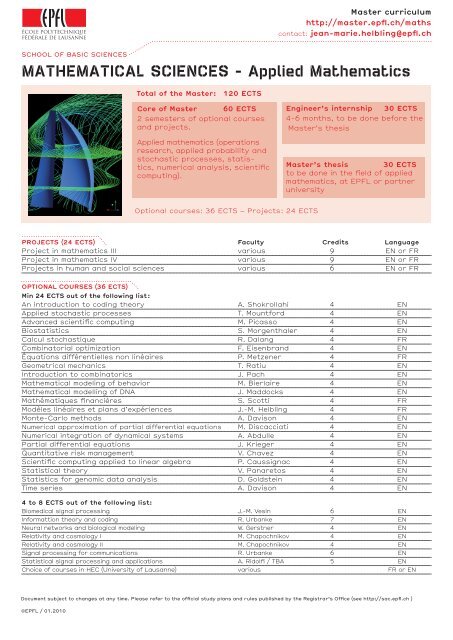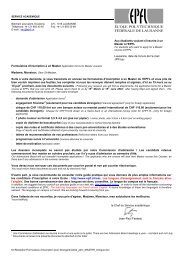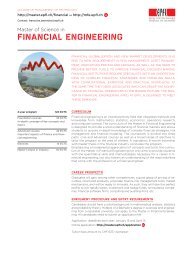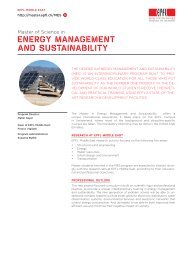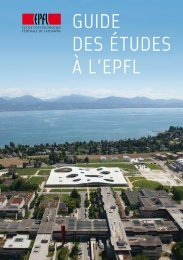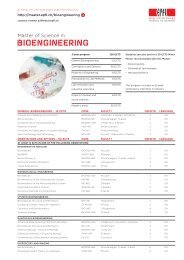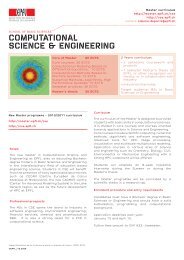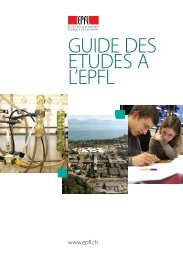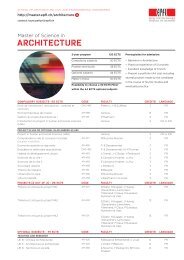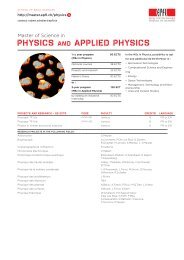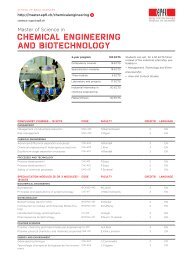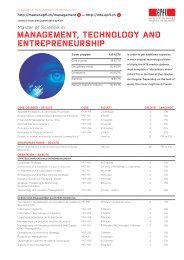MATHEMATICAL SCIENCES - Applied Mathematics - Master | EPFL
MATHEMATICAL SCIENCES - Applied Mathematics - Master | EPFL
MATHEMATICAL SCIENCES - Applied Mathematics - Master | EPFL
Create successful ePaper yourself
Turn your PDF publications into a flip-book with our unique Google optimized e-Paper software.
<strong>Master</strong> curriculum<br />
http://master.epfl.ch/maths<br />
contact: jean-marie.helbling@epfl.ch<br />
SCHOOL OF BASIC <strong>SCIENCES</strong><br />
<strong>MATHEMATICAL</strong> <strong>SCIENCES</strong> - <strong>Applied</strong> <strong>Mathematics</strong><br />
Total of the <strong>Master</strong>: 120 ECTS<br />
Core of <strong>Master</strong> 60 ECTS<br />
2 semesters of optional courses<br />
and projects.<br />
<strong>Applied</strong> mathematics (operations<br />
research, applied probability and<br />
stochastic processes, statistics,<br />
numerical analysis, scientific<br />
computing).<br />
Engineer’s internship 30 ECTS<br />
4-6 months, to be done before the<br />
<strong>Master</strong>’s thesis<br />
<strong>Master</strong>’s thesis<br />
30 ECTS<br />
to be done in the field of applied<br />
mathematics, at <strong>EPFL</strong> or partner<br />
university<br />
Optional courses: 36 ECTS – Projects: 24 ECTS<br />
PROJECTS (24 ECTS) Faculty Credits Language<br />
Project in mathematics III various 9 EN or FR<br />
Project in mathematics IV various 9 EN or FR<br />
Projects in human and social sciences various 6 EN or FR<br />
OPTIONAL COURSES (36 ECTS)<br />
Min 24 ECTS out of the following list:<br />
An introduction to coding theory A. Shokrollahi 4 EN<br />
<strong>Applied</strong> stochastic processes T. Mountford 4 EN<br />
Advanced scientific computing M. Picasso 4 EN<br />
Biostatistics S. Morgenthaler 4 EN<br />
Calcul stochastique R. Dalang 4 FR<br />
Combinatorial optimization F. Eisenbrand 4 EN<br />
Équations différentielles non linéaires P. Metzener 4 FR<br />
Geometrical mechanics T. Ratiu 4 EN<br />
Introduction to combinatorics J. Pach 4 EN<br />
Mathematical modeling of behavior M. Bierlaire 4 EN<br />
Mathematical modelling of DNA J. Maddocks 4 EN<br />
Mathématiques financières S. Scotti 4 FR<br />
Modèles linéaires et plans d’expériences J.-M. Helbling 4 FR<br />
Monte-Carlo methods A. Davison 4 EN<br />
Numerical approximation of partial differential equations M. Discacciati 4 EN<br />
Numerical integration of dynamical systems A. Abdulle 4 EN<br />
Partial differential equations J. Krieger 4 EN<br />
Quantitative risk management V. Chavez 4 EN<br />
Scientific computing applied to linear algebra P. Caussignac 4 EN<br />
Statistical theory V. Panaretos 4 EN<br />
Statistics for genomic data analysis D. Goldstein 4 EN<br />
Time series A. Davison 4 EN<br />
4 to 8 ECTS out of the following list:<br />
Biomedical signal processing J.-M. Vesin 6 EN<br />
Informattion theory and coding R. Urbanke 7 EN<br />
Neural networks and biological modeling W. Gerstner 4 EN<br />
Relativity and cosmology I M. Chapochnikov 4 EN<br />
Relativity and cosmology II M. Chapochnikov 4 EN<br />
Signal processing for communications R. Urbanke 6 EN<br />
Statistical signal processing and applications A. Ridolfi / TBA 5 EN<br />
Choice of courses in HEC (University of Lausanne) various FR or EN<br />
Document subject to changes at any time. Please refer to the official study plans and rules published by the Registrar’s Office (see http://sac.epfl.ch )<br />
©<strong>EPFL</strong> / 01.2010
<strong>Master</strong> curriculum<br />
http://master.epfl.ch/maths<br />
contact: jean-marie.helbling@epfl.ch<br />
SCHOOL OF BASIC <strong>SCIENCES</strong><br />
<strong>MATHEMATICAL</strong> <strong>SCIENCES</strong> - Statistics and Finance<br />
Total of the <strong>Master</strong>: 120 ECTS<br />
Core of <strong>Master</strong> 60 ECTS<br />
2 semesters of optional courses &<br />
projects<br />
Statistics and Finance: mathematical<br />
statistics, applied stochastic<br />
processes, data analysis projects,<br />
mathematical finance, risk management.<br />
Engineer’s internship<br />
30 ECTS<br />
4-6 months, to be done before the<br />
<strong>Master</strong>’s thesis<br />
<strong>Master</strong>’s thesis<br />
30 ECTS<br />
to be done in the field of financial<br />
or statistical mathematics, at <strong>EPFL</strong><br />
or partner university<br />
Compulsory courses: 8 ECTS - Projects: 24 ECTS - Optional courses: 28 ECTS<br />
Theoretical and practical knowledge of statistical methods and probability models are highly valued in the modern<br />
job market. Among activities that rely heavily on statistical methodology are financial analysis and engineering, risk<br />
management, implementation of efficient production lines, assessment of the viability of pharmaceutical products,<br />
quality assurance for a mechanical component or an administrative procedure, and the analysis of societal trends.<br />
A typical student entering the <strong>Applied</strong> <strong>Mathematics</strong> program has a Bachelor degree in <strong>Mathematics</strong>. The orientation<br />
in Statistics and Finance will also accept students with an adequate mathematical training and ability from other<br />
quantitative backgrounds, for example physics, computer science, or some fields of engineering. Students with<br />
a good scientific background can also be admitted for this orientation; they will have to make up deficiencies<br />
by taking additional mathematics courses, and so will complete the degree over a slightly extended period.<br />
Students who successfully complete this degree should find an attractive, diverse, and growing job<br />
market. For example, banks and small to medium firms specializing in financial services frequently look<br />
for individuals who are simultaneously competent in stochastic modeling, in programming, and in basic<br />
finance. There is a large job market for students having a background in biostatistics. A choice of more<br />
theoretical courses will prepare students for research in statistics, applied probability, or related fields.<br />
PROJECTS (24 ECTS) Faculty Credits Language<br />
Project in mathematics III: analyse de données D. Goldstein 9 FR<br />
Project in mathematics IV various 9 EN or FR<br />
Projects in human and social sciences various 6 EN or FR<br />
COMPULSORY COURSES (8 ECTS)<br />
<strong>Applied</strong> stochastic processes T. Mountford 4 EN<br />
Statistical theory V. Panaretos 4 EN<br />
OPTIONAL COURSES (28 ECTS)<br />
Min 16 ECTS out of the following list:<br />
<strong>Applied</strong> stochastic processes T. Mountford 4 EN<br />
Advanced scientific computing M. Picasso 4 EN<br />
Biostatistics S. Morgenthaler 4 EN<br />
Calcul stochastique R. Dalang 4 FR<br />
Combinatorial optimization F. Eisenbrand 4 EN<br />
Mathématiques financières S. Scotti 4 FR<br />
Modèles linéaires et plans d’expériences J.-M. Helbling 4 FR<br />
Monte-Carlo methods A. Davison 4 EN<br />
Quantitative risk management V. Chavez 4 EN<br />
Statistical theory V. Panaretos 4 EN<br />
Statistics for genomic data analysis D. Goldstein 4 EN<br />
Time series A. Davison 4 EN<br />
The remaining credits (up to 12 ECTS) may be taken in the catalogue of courses of the <strong>Master</strong> in <strong>Applied</strong><br />
<strong>Mathematics</strong> (Mathematical Sciences) or in theoretical mathematics (<strong>Master</strong> in <strong>Mathematics</strong>).<br />
Document subject to changes at any time. Please refer to the official study plans and rules published by the Registrar’s Office (see http://sac.epfl.ch )<br />
©<strong>EPFL</strong> / 01.2010 - Picture © copyright Getty Images, Inc.


